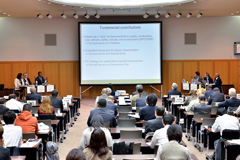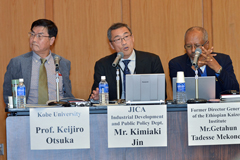Effectiveness of Kaizen for Africa’s Industrial Development Confirmed at Book Launch Event
2018.12.27
On Nov. 20, 2018, JICA Research Institute (JICA-RI) held a book-launching event for “Applying the Kaizen in Africa: A New Avenue for Industrial Development.” The book contains findings of the research project "The Kaizen for Industrial Development in Africa."
Since 2006, JICA has been rolling out technical cooperation projects utilizing Kaizen, a Japanese management methodology, in nine African countries including Ethiopia and Kenya. The new book is a comprehensive report of the findings of the research project, including how to implement Kaizen, success stories, and proposals for further dissemination.

Questions from the audience showed interest in prospective industrial development in Africa
The event kicked off with opening words from Izumi Ohno, director of JICA-RI. She expressed her hope that this event will help deepen people’s understanding of JICA's Kaizen projects and become a step leading to the Seventh Tokyo International Conference on African Development (TICAD7) to be held in August 2019 in Yokohama.
Next, Keijiro Otsuka, professor emeritus of Kobe University and one of the editors of the book, gave an overview of the book. He introduced the first chapter, which explains how Kaizen contributes to Africa’s future. He said that it is not an exaggeration to say industrialization cannot happen without Kaizen since it has been demonstrated across the globe that Kaizen significantly contributes to improved productivity.

From left, Keijiro Otsuka, Kimiaki Jin and Getahun Tadesse Mekonen
Kimiaki Jin, JICA Industrial Development and Public Policy Department and one of the editors of the book, explained about chapters two, three and four. Citing the "Africa KAIZEN Initiative," he introduced JICA's efforts to encourage active participation of governments by establishing central organizations. He also talked about differences between Kaizen styles, stating that Western-style Kaizen is good for attaining short-term results with mass production, while Japanese-style Kaizen, as represented by Toyota's production system, focuses on human development and is effective in raising motivation and providing workers with skills. He also stressed that Kaizen can be implemented easily and at a low cost, and is therefore appropriate for African countries with a large number of small and medium-sized enterprises.
Getahun Tadesse Mekonen, former director general of the Ethiopian Kaizen Institute (EKI), then introduced Kaizen success stories in Ethiopia featured in chapter five. JICA's Kaizen project kicked off in Ethiopia in 2009 with full cooperation from the country's government, and EKI has put in much effort including customized training for companies and organizations in local languages. Mekonen said that from 2012 to 2016, EKI provided Kaizen training to 473 groups and 68,954 people and now huge improvement can be seen in labor productivity and cost reductions.
Otsuka returned to introduce chapter six regarding Africa's measures for industrial development. He talked about the effectiveness of the sequential support of Training, Infrastructure and Financial (TIF) Support in promoting industrial development. TIF strategy incorporates human resources development through Kaizen training, infrastructure development such as industrial parks that invite direct investment from overseas, and financial support to promising companies.
Next, three speakers offered their opinions on the book. Christian Otchia, associate professor at Nagoya University, commended the book, saying that it is a useful textbook for all countries, with specific examples on how to implement Kaizen. He noted that while Kaizen is primarily meant for manufacturing, many African countries heavily rely on agriculture, so in order to disseminate an African-style Kaizen, a complementary approach is needed based on each country's value chain.

From left, Ndiyoi Mutiti, Takehiko Ochiai and Christian Otchia
Takehiko Ochiai of Toyota Tsusho Corporation, a company with a wide network throughout Africa, introduced their Kaizen and corporate social responsibility efforts. He said that implementing Kaizen raises awareness on just-in-time delivery, strengthening teamwork, reducing waste and more, and they have been able to significantly improve productivity and working environments. Moreover, he introduced that Toyota Tsusho Corporation has contributed greatly to human resources development in Africa, for example through the "Toyota Kenya Academy," an occupational training facility jointly established with JICA in 2014.
Ndiyoi Mutiti, ambassador of the Republic of Zambia to Japan, spoke as a representative of African countries promoting Kaizen. She noted that, although there is rapid economic growth in sub-Saharan Africa including Zambia, the growth is driven by rising prices of natural resources, therefore, it is necessary to enhance competitiveness of local companies through improved productivity. She added that through Kaizen and industrial development, she hopes to see countries break away from their dependence on ODA and build relationships of mutual benefit with Japan.
Questions from the audience showed interest in prospective industrial development and economic growth in Africa. For example, a participant asked whether it is possible to apply Japanese-style Kaizen in Africa. Another participant asked, regarding the industrial development in Africa, if implementing Kaizen is one of the priorities for African countries or if they should focus on other areas.
The closing words were given by Hiroshi Kato, JICA senior vice president. He said that Kaizen would surely promote industrial development in African countries, where economic growth via industrialization is recognized to be a pressing mission. He explains that now there is a growing interest for Japanese companies in the African market, and if Kaizen is applied there, it will promote communication between both sides and effectively lead to industrial development.

事業事前評価表(地球規模課題対応国際科学技術協力(SATREPS)).国際協力機構 地球環境部 . 防災第一チーム. 1.案件名.国 名: フィリピン共和国.

事業事前評価表(地球規模課題対応国際科学技術協力(SATREPS)).国際協力機構 地球環境部 . 防災第一チーム. 1.案件名.国 名: フィリピン共和国.

事業事前評価表(地球規模課題対応国際科学技術協力(SATREPS)).国際協力機構 地球環境部 . 防災第一チーム. 1.案件名.国 名: フィリピン共和国.

事業事前評価表(地球規模課題対応国際科学技術協力(SATREPS)).国際協力機構 地球環境部 . 防災第一チーム. 1.案件名.国 名: フィリピン共和国.

事業事前評価表(地球規模課題対応国際科学技術協力(SATREPS)).国際協力機構 地球環境部 . 防災第一チーム. 1.案件名.国 名: フィリピン共和国.
scroll